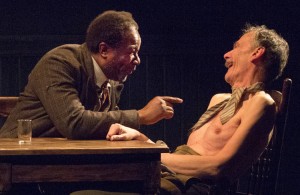Written in 1942, Eugene O’Neill’s A Touch of the Poet was intended to be the first of multiple plays about the Irish experience in America. O’Neill’s cycle was never completed, and the play was produced posthumously, in 1958. The Irish Repertory Theatre’s revival, masterfully directed by Ciaran O’Reilly, is a gut-wrenching drama that focuses on the Irish American Melody clan in the Boston of 1828. Led by Con (for Cornelius) Melody (Robert Cuccioli), a ne’er-do-well immigrant and inn owner who recites Lord Byron’s poetry, most of the characters live in a world full of delusions.
Ah, Wilderness!
It’s surprising that Ah, Wilderness! doesn’t get done more often. Eugene O’Neill’s only full-length comedy—not, he later said, an autobiography, but a look back at the teen years he wished he’d had—the gentle two-acter is warmhearted, smart about intergenerational conflict, and extremely influential. It’s the template for every stage family comedy from You Can’t Take It With You to Morning’s at Seven and beyond, not to mention countless TV sitcoms, up to and including Modern Family. It rings with universal truths that are easy to identify with, and it’s not hard to stage.
Long Day’s Journey Into Night
It’s a truism that Eugene O’Neill’s Long Day’s Journey Into Night is long and repetitious, so it comes as a surprise that Richard Eyre’s production plays so grippingly that it's never a slog. Eyre makes it clear that the Tyrones, the family at its center (based O’Neill’s own), are deeply dysfunctional, but each repetition at the BAM Harvey Theater rings true, and many of them prove comical. Each character knows the others’ strengths and frailties. Yet although they claw at one another often, there’s pulsing love in this family.
Strange Interlude
Strange Interlude, one of four Eugene O’Neill plays to have won a Pulitzer Prize, is brilliant, magisterial, and provocative. How then, does one actor, David Greenspan, take the complex story of Nina Leeds and the four men in her life, a play that is written in nine acts and spans five hours in the telling, and deliver the highs and the lows, the strange twists of fate, the loves, and the schemes of its characters? Dressed in a dapper three-piece suit, Greenspan is alternately Nina, Charles, Ned and Sam (and three minor characters as well), maintaining an energetic, staccato presence while shifting, sometimes with gunfire rapidity, among these characters. Who would have imagined that this 1928 whale of a play could be acted as a one-man show to riveting effect? Greenspan is extraordinary, and he brings to life an extraordinary play.
Mourning Becomes Electra
Target Margin Theater’s production of Eugene O’Neill’s Mourning Becomes Electra signals its nonconformist nature by having its audience to gather outside the Abrons Art Center, packed together like rush-hour travelers. The production, which is part promenade, rejects the usual, classical interpretation of O’Neill’s trilogy, which has often proved difficult to pull off. But director David Herskovits, in his progressively exhilarating realization of Mourning Becomes Electra, comes close to throwing off the curse.
Delusions Unto Death
After seeing the Goodman Theatre revival of The Iceman Cometh in Brooklyn, it’s tempting to wonder what Eugene O’Neill would have thought of purveyors of the modern 90-minute intermissionless play. Sloth-ridden pikers, perhaps? O’Neill’s late masterpiece runs four hours and 45 minutes at BAM, and it is surely one of the bleakest plays ever written. Don’t let that put you off, however. Robert Falls’s magnificent production may require a marathon sitting, but it’s worth it.
The setting is 1912, in a combination saloon and rooming house filled with those who have hit rock bottom. The proprietor is Stephen Ouimette’s cantankerous Harry Hope (O’Neill’s sense of irony is not subtle), and the denizens are a collection of drunks, waking up gradually in the gloom. At first Natasha Katz’s remarkable lighting barely registers; then it slowly reveals the tables of inebriates.
The group is awaiting Theodore “Hickey” Hickman (Nathan Lane), whose annual arrival for Harry’s birthday party is imminent. Among those on hand are ex-anarchist Larry Slade (Brian Dennehy); Hugo, a Russian-accented anarchist (Lee Wilkof); Ed Mosher (Larry Heumann Jr.), who is Harry’s brother-in-law and worked for the circus; and Joe Mott (John Douglas Thompson), an ex-gambler on the skids who cleans the bar. Other characters include two Boer War veterans from opposing sides and a correspondent in that war; two bartenders; and a trio of self-styled “tarts.”
During the next 48 hours the last vestiges of hope for any of them are stripped away. Before Hickey’s arrival the burnt-out Larry is approached by Don Parritt (Patrick Andrews), a young man whose mother is a firebrand anarchist more devoted to the movement than to him; Don has always looked up to Larry as a father, but now Larry wants Don to take a powder. Someone has sold out the movement, and Don’s mother has been arrested.
When Hickey shows up, he delivers a shock to the group. He’s no longer a drinker. He has faced himself and he has become an evangelist for truth-telling. The Hickey part doesn’t seem tailored to Nathan Lane’s acknowledged comic brilliance, but Lane not only finds comedy where it isn’t apparent, he proves himself a powerful dramatic actor (to be fair, he has done dramatic parts before, but nothing compared to this). The evangelist’s fire and the do-gooder’s brass, the glad-hander’s cheer and optimism—Lane has them all. He jokes around as a salesman must, and yet he also excoriates the others’ “pipe dreams.” You’ll be sick of that phrase by the end of the evening, with “take a hop off the fire escape” a close second—O’Neill overwrites, but he also supplies plenty of humor, and even the repetition, while trying one’s patience, gathers a cumulative, relentless force.













